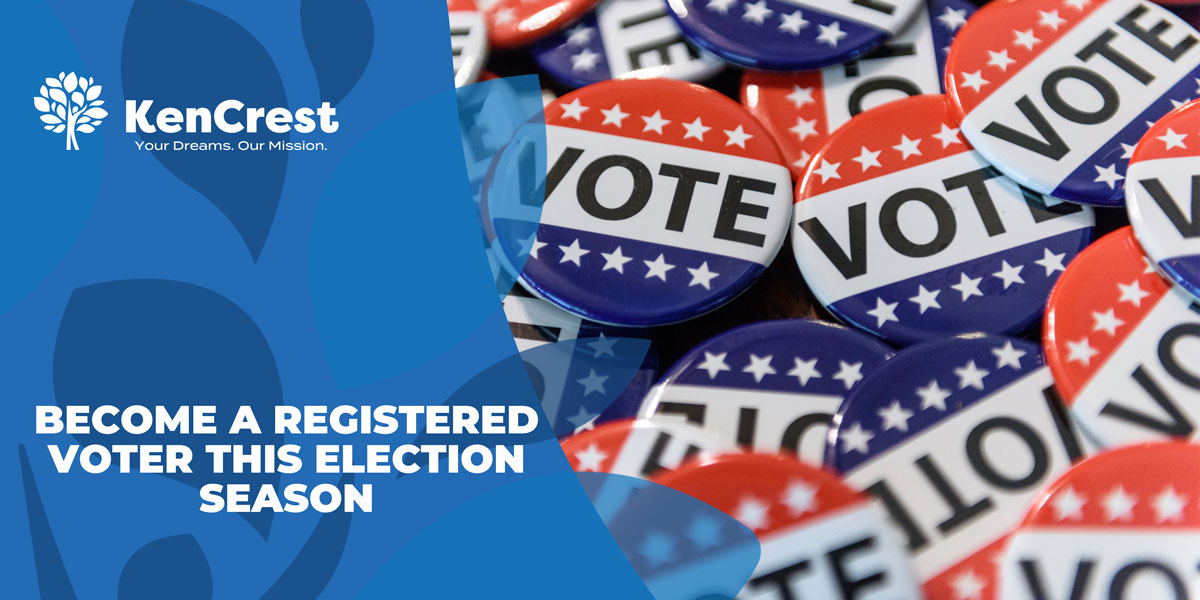Become a Registered Voter This Election Season

Exercise your right to vote this election season by becoming a registered voter and making your voice heard.
By Sydney Kerelo
Today, in 2024, most American citizens over 18 have the right to vote in federal and state elections. Still, many face barriers to voting, especially those with an intellectual or developmental disability.
According to the ACLU, “In 2021 alone, more than 400 anti-voter measures were introduced by states across the country, many of which are most burdensome to people of color and those with disabilities.”
And this isn’t the first time restrictions have been put on voters. Until the 15th Amendment passed in 1869, black men were not allowed to vote, and even after, they faced hurdles like poll taxes, literacy tests, and other measures to discourage them from voting.
According to National Geographic, this continued until the 24th Amendment in 1964, which eliminated the poll tax, and the Voting Rights Act of 1965, which ended Jim Crow laws. Women were denied the right to vote until 1920, when the women’s suffrage movement resulted in the 19th Amendment.
People fought for their right to vote for decades; in 2024, people still struggle to get the proper access and support to vote. This election season, take action early and fight against voter suppression by registering early and preparing to cast your ballot.
Why is it important to vote?
Every voice matters no matter whose voice it is. Everyone has the right to speak their mind and choose a candidate with whom their ideals align. Even though a vote may not directly elect the president, if others join it in your district or county, your vote may matter regarding electoral results.
According to National Geographic, “A Portland State University study found that fewer than 15 percent of eligible voters were turning out to vote for mayors, council members, and other local offices. Low turnout means that important local issues are determined by a limited group of voters, making a single vote even more statistically meaningful.”
Every vote matters, and it’s essential to exercise your right to vote and continue to fight against racism and discrimination.
How to make your voice heard
One of the most significant ways to make your voice heard is by registering to vote. You can do this by filling out a voter registration application form online, by mail, or in person at your county voter registration office and other government agencies.
If you are registered to vote but can’t attend the polls because of a disability or other reason, request an absentee ballot. All U.S. states permit people with disabilities or illness to vote absentee and either mail in or drop off their vote at a local polling station.
When casting a vote, one crucial thing to remember is to know your rights. The Americans with Disabilities Act and the Voting Rights Act require election workers to ensure that polling places are accessible for everyone and that at least one voting system allows people to vote privately and independently. It requests that voters with disabilities receive in-person help and for election workers to make any other reasonable accommodations needed.
If you are preparing for the 2024 voting season in Pennsylvania, there are a few important dates to remember:
*These dates are subject to change; check vote.pa.gov for deadline changes.
- April 8 — Last day to register to vote in the Primary Election.
- April 16 — Last day to request a mail-in or absentee ballot.
- April 23 — Primary Elections.
- October 21 — Last day to register to vote for the general elections.
- October 29 — Last day to request a mail-in or absentee ballot.
- November 5 — General Elections.
